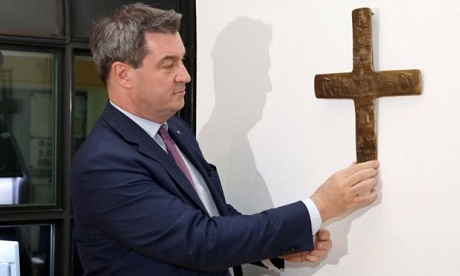The Bavarian state government’s order to put crosses at the entrances of all state administrative buildings by 1 June is unpopular with many Germans.
It has also drawn disapproving comments from Cardinal Reinhard Marx of Munich.
However, Bavarian state leader Markus Söder says the crosses should reflect Bavaria’s “cultural identity and Christian-Western influence.”
Its public schools and courtrooms are already obliged to display crosses at entrances.
The Söder government’s decision followed last September’s federal election, which saw a rise in support for the anti-immigration and populist Alternativ für Deutschland (Alternative for Germany) party.
The directive to hang the crosses has sparked a public debate in Germany, with the country divided by questions of heritage, religion and identity.
Marx says the state government’s decision has triggered “Division, stirred up trouble and played people off against one another.
“If the cross is just seen as a cultural symbol, then it has not been understood”, Marx said.
Rather than a cultural symbol, the cross is a sign of opposition to violence, injustice, sin and death but not a sign against other people, he pointed out.
The debate about the cross was important as it had brought to light the need to discuss what it meant to live in a country moulded by Christianity.
“The cross means including everyone, Christians, Muslims, Jews and non-believers,” Marx said.
Source
